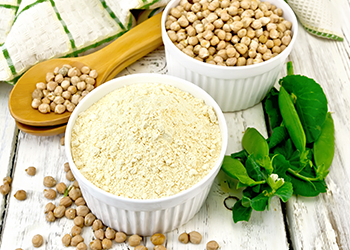As a personal trainer, a common question from clients is about the benefits of regula protein shake.
Regular exercisers can benefit from increased protein intake.
But do you fully understand what those benefits are and how much protein powder you need for those benefits?
To help you with this, I got my dietitian to help out and create this easy-to-follow guide. I also cover what protein powders to consider.
Quick Summary
- Protein powder is beneficial for those who exercise regularly, aiding in weight loss, improving exercise recovery, and enhancing muscle building.
- Recommended protein powders include milk-based, plant-based, and branched-chain amino acids, each catering to different dietary needs and preferences.
- Dietary guidelines suggest up to 3 grams of protein per pound of body weight for muscle building, highlighting the importance of adequate protein intake for athletes and bodybuilders.
- In my opinion, protein powders are a convenient way to supplement protein intake, they should complement a balanced diet and not replace whole food sources.
Do Protein Powders Provide Health Benefits?

There are three main areas where protein powder can help you out.
1. Weight Loss
Most people who go through constant fat loss and weight gain fluctuations most likely have the wrong macrobalance.
Analysis often shows my clients' diets are high in carbs.
And that's simply not a recipe to help you lose weight.
A study published on the National Library of Medicine website suggests that rebalancing a healthy diet towards protein improves people's control over their appetite and fat mass [1].
2. Exercise Recovery
Exercise recovery, crucial for all athletes, focuses on optimizing muscle protein synthesis.
This is a process where muscle damage from physical strain is repaired by transforming amino acids into new muscle tissue [2].
This process is important for avoiding post-exercise stiffness and to help you maintain muscle mass.
3. Muscle Building
From my experience as a bodybuilder, muscle building is crucial. I've learned that to effectively bulk up, it's essential to consume a specific amount of protein daily, tailored to individual needs and workout intensity.
Based on some dietary recommendations, you should aim for up to 3 grams of protein for every one pound of weight [3]. And while you can get a lot of that through your food, you might not exactly fancy eating another chicken breast after you finish at the gym.
That's why a protein shake might be the best option to support muscle growth immediately after weight training, protein shakes post-workout offer rapid protein to muscles, aiding in repair and growth when solid food is impractical or less appealing due to time constraints or reduced appetite after intense exercise.
Are Certain Protein Powders Better For You?

To answer this, I had a dietitian break things down into three important categories.
Milk-Based Protein
Whey protein powder, common due to its essential amino acids, is favored by athletes [4].
Casein protein powder, an alternative, may be more expensive and less suitable for sensitive stomachs.
“Whey concentrate is higher in carbs and lower in protein compared to whey isolate and hydrolyzed whey. It also contains larger amounts of lactose, so it may cause digestive problems in those with milk allergy or lactose intolerance. Its protein content varies between 30 percent and 90 percent.”
- Andra Picincu, Writer at SFGate.com
Plant-Based Protein Powders

Many people have made the switch to vegan protein powder, even if they don't stick with a plant diet.
One downside is that with the exception of hemp protein powder, most plant proteins need to be blended to get the full amino acid profile [5].
That's why you usually see a mix of soy, brown rice, and pea protein powder. It's a simple solution, and some people find it easier on the stomach.
Branched Chain Amino Acids (BCAAs)
This is a special type of protein powder for high-performance athletes. It isolates leucine, isoleucine, and valine, which are vital for muscle function [6]. Taking these just before or after a heavy training session may help with performance levels and recovery time.
The bottom line here is that whey protein powder is one of the best options for non-vegans, and you'll find that it's the most commonly available one.
Should You Use Protein Powders To Balance Your Macros?
Protein powder simplifies achieving the right macro balance, especially during high-protein bulking phases.
Imagine a 200-pound bodybuilder aiming for 700 grams of protein each day.
It will happen more often than not that you simply can't look at protein-rich foods for breakfast, lunch, and dinner. Protein-rich shakes can significantly ease macro balancing.
However, some people start drinking more protein shakes in order to replace their meals, without knowing that shakes do not maintain satiety for a long time.
Edible Quintero of Health Insider shares that this could result in weight gain because hunger can lead you to snack on other foods.
Are There Side Effects Of Taking Too Much Protein Powder?

Yes, there can be some side effects from significantly exceeding the recommended dietary allowance of 2 grams of protein per pound of body weight.
Overconsumption issues often arise from eating too much protein at once, like a large protein-heavy meal followed by a protein shake.
That's a lot of protein for your stomach, and it can cause stomach cramps and bloating [7].
Julio Lopez, a nutrition specialist and a certified personal trainer at 365 Physique, adds that too much protein can also result in unnecessary and unhealthy weight gain.
While protein is an important piece in an individual’s weight loss journey, one must consider the caloric density of protein powders.
If one consumes too much protein, this could take a person out of a caloric deficit, which can lead to weight gain, particularly if the pattern is recurring for weeks and months.
That's why you need to space out your protein intake carefully throughout the day.
Also, if you have health conditions such as kidney disease, then you need to discuss such a diet approach with your doctor first.
FAQs
Can You Take Too Much Protein Powder in One Go?
Yes, you can take too much protein powder in one go. Most protein powders recommend 1 to 1 1/2 scoops per shake, and anything more than that could cause bloating and cramps.
Are Protein Powders Bad if You Don’t Exercise?
No, protein powders aren't bad if you don't exercise. But they will have a limited effect on your body, especially lean muscles.
References:
- https://pubmed.ncbi.nlm.nih.gov/25926512/
- https://journals.humankinetics.com/view/journals/ijsnem/aop/article-10.1123-ijsnem.2021-0139/article-10.1123-ijsnem.2021-0139.xml
- https://examine.com/guides/protein-intake/
- https://jissn.biomedcentral.com/articles/10.1186/s12970-020-00401-5
- https://integrishealth.org/resources/on-your-health/2022/august/how-to-eat-complete-proteins-in-vegetarian-and-vegan-diets
- https://www.webmd.com/vitamins-and-supplements/branched-chain-amino-acids-uses-risks
- https://www.medicalnewstoday.com/articles/322825#side-effects
About The Author
You May Also Like






